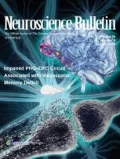

References
Shuai Y, Lu B, Hu Y, Wang L, Sun K, Zhong Y. Forgetting is regulated through rac activity in Drosophila. Cell 2010, 140: 579–589.
Dong T, He J, Wang S, Wang L, Cheng Y, Zhong Y. Inability to activate Rac1-dependent forgetting contributes to behavioral inflexibility in mutants of multiple autism-risk genes. Proc Natl Acad Sci U S A 2016, 113: 7644–7649.
Anacker C, Hen R. Adult hippocampal neurogenesis and cognitive flexibility - linking memory and mood. Nat Rev Neurosci 2017, 18: 335–346.
Yap EL, Greenberg ME. Activity-regulated transcription: bridging the gap between neural activity and behavior. Neuron 2018, 100: 330–348.
Sun X, Lin Y. Npas4: Linking neuronal activity to memory. Trends Neurosci 2016, 39: 264–275.
Bepari AK, Sano H, Tamamaki N, Nambu A, Tanaka KF, Takebayashi H. Identification of optogenetically activated striatal medium spiny neurons by Npas4 expression. PLoS One 2012, 7: e52783. https://doi.org/10.1371/journal.pone.0052783.
Chen X, Rahman R, Guo F, Rosbash M. Genome-wide identification of neuronal activity-regulated genes in Drosophila. Elife 2016, 5:e19942. https://doi.org/10.7554/elife.19942.
Quinn WG, Harris WA, Benzer S. Conditioned behavior in Drosophila-Melanogaster. Proc Natl Acad Sci U S A 1974, 71: 708–712.
Bier E. Drosophila, the golden bug, emerges as a tool for human genetics. Nat Rev Genet 2005, 6: 9–23.
He QY, Wang JH, Hu HL. Illuminating the activated brain: emerging activity-dependent tools to capture and control functional neural circuits. Neurosci Bull 2019, 35: 369–377.
Fujita N, Nagata Y, Nishiuchi T, Sato M, Iwami M, Kiya T. Visualization of neural activity in insect brains using a conserved immediate early gene, Hr38. Current Biol 2013, 23: 2063–2070.
Miyashita T, Kikuchi E, Horiuchi J, Saitoe M. Long-term memory engram cells are established by c-Fos/CREB transcriptional cycling. Cell Rep 2018, 25: 2716–2728.e3.
Awata H, Takakura M, Kimura Y, Iwata I, Masuda T, Hirano Y. The neural circuit linking mushroom body parallel circuits induces memory consolidation in Drosophila. Proc Natl Acad Sci U S A 2019, 116: 16080–16085.
Tully T, Quinn WG. Classical conditioning and retention in normal and mutant Drosophila melanogaster. J Compar Physiol 1985, 157: 263–277.
Mao ZM, Roman G, Zong L, Davis RL. Pharmacogenetic rescue in time and space of the rutabaga memory impairment by using Gene-Switch. Proc Natl Acad Sci U S A 2004, 101: 198–203.
Sun X, Bernstein MJ, Meng M, Rao S, Sørensen AT, Yao L, et al. Functionally distinct neuronal ensembles within the memory engram. Cell 2020, 181, 410–423.e417.
Acknowledgements
We thank helpful comments on this study from Bo Lei, Yinzhong Zhou and Lingling Wang, and experimental help from Lianzhang Wang. This work was supported by grants from the National Natural Science Foundation of China (31970955 and 31700912).
Author information
Authors and Affiliations
Corresponding author
Ethics declarations
Conflict of interest
The authors declare that they have no conflict of interest in this work.
Electronic supplementary material
Below is the link to the electronic supplementary material.
Rights and permissions
About this article
Cite this article
Liu, T., Wang, L. & Li, Q. Drosophila Ortholog of Mammalian Immediate-Early Gene Npas4 is Specifically Responsive to Reversal Learning. Neurosci. Bull. 37, 99–102 (2021). https://doi.org/10.1007/s12264-020-00566-8
Received:
Accepted:
Published:
Issue Date:
DOI: https://doi.org/10.1007/s12264-020-00566-8

